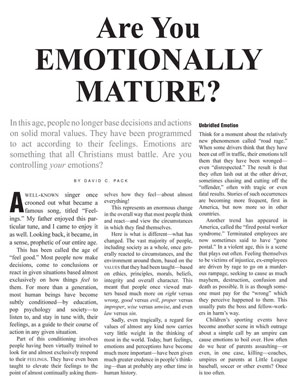To this point, we have almost exclusively discussed dating. But what about courting? Every relationship reaches a point at which the couple will either become more interested, and want to pursue a more serious relationship, or they will decide that they are not seriously attracted to each other, and will (or should) agree to “just be friends.”
There is no specific moment when you suddenly find yourself “courting.” However, as dating becomes more involved, and as a person becomes more seriously interested in that one other person, there is a transition period when the couple goes from dating to courting. It should generally not occur like the flipping of a switch, as with engagement, but rather like the gradual turning up of a light on a rheostat.
Prior to this point, it is a mistake to believe that dating is done exclusively with one person. There is a process during which you slowly progress from dating many different people in one-on-one settings to perhaps thinking someone is particularly interesting, and choosing to date her (or him) a few more times, in order to determine that she is the person you want to more seriously pursue. This process could take months, many months, or even years, depending on how quickly you find someone compatible with you at all levels. (This phase could be preceded by having narrowed your dating down to two or three possible candidates for marriage.) It is at this final stage, however, that courtship begins, and you only date that one person from that point forward.
But reaching the stage of courtship should never mean that a couple has already decided to get married. They have merely reached the stage where more serious exploration of what has already become a mutual interest should occur.
There are many important things to evaluate as you begin to court. This is really the point at which you begin to consider a person as a possible lifelong mate. Using wisdom and judgment is crucial before getting too emotionally involved. Following is a series of areas for couples to consider after having become more interested. In essence, courtship is the decision to take the next step—a more serious step, but not the final step!
Seeking God’s Way
Return for a moment to the starting point. The best way to pick the best person for you is to not pick at all—to leave the decision in God’s hands! His ways and understanding are infinitely better than ours (Isa. 55:8), and He is the only One who can lead you to the right person!
But you must be willing to do your part.
In a sense, God’s way of dating is a natural process—you will naturally enjoy being with certain types of people more than others. But this natural feeling of comfort and discomfort with certain types of personalities will come, only if you have made it a goal to date widely before ever considering a serious relationship. By the time you are ready to court (if you have followed God’s way), you will be successful in finding a mate.
Finding and choosing a mate is a process best left to God’s overall direction. You cannot know if you have found the “right one” unless you have (figuratively speaking) allowed God to take you by the hand, and lead you to him or her—and He will if you let Him! Remember, God’s Spirit will not guide you if you are unwilling to wait until the right time to even begin thinking about the right person. Be willing to let God activate your mind! Allow Him to cause you to react to—to lean more and more toward—that one person!
At the same time, seek wise counsel and advice! Do not allow yourself to reach the point where you have succumbed to emotion without first counseling.
Do not misunderstand. It is a wonderful feeling to be on “cloud nine”—to be in love. Few things in life are comparable to this. Nevertheless, there is a period during the first stages of serious dating and courting when you can still make sound judgments without heavy emotional attachment. Try to think of this in the following way: It is important to suppress feelings of romantic love (eros), while carefully focusing on and building the bond of true friendship (philia), all the while practicing and developing the love of God (agape) within the relationship.
Take advantage of this time!
Let me repeat. No matter your age, counsel with your parents. Ask them for specific advice on your situation. Where possible, talk with others with the same values and who have recently experienced dating, courtship and marriage. If they know you well, this is even better.
It is important to pay special attention to those who set the right example, but also learn from those who are willing to share their stories of difficulty or regret. Ask yourself, “Am I going to learn by following a right example, or will I force myself to learn the hard way by following my will instead of God’s will?”
As you court and consider engagement, it is absolutely vital to counsel with a true minister of God. And while many postpone counseling until the last moment, it is always better to err on the side of counseling too early in the relationship rather than too late. God’s ministers are in place to guide you, to help you further understand God’s will. Although there can be exceptions, the man may generally take the lead, and counsel with the minister first. But the woman should not fear to come first.
Remember that in this world, dating and courtship are founded on lust: “For ALL [all means all] that is in the world, the lust of the flesh, and the lust of the eyes, and the pride of life, is not of the Father, but is of the world” (I John 2:16).
Recall that, within this passage, attitudes of the world are identified by three categories: Lust of flesh, lust of eyes, and pride of life! These three describe the way society typically dates—the natural, physical approach to picking a mate! Be absolutely certain that you are not, however unconsciously, using the world’s standards in choosing a mate!
Never forget that you must build an entirely different kind of foundation. You must care—have outgoing concern—for the other person. The Bible exhorts us to “love one another: for love is of God; and every one that loves is born [begotten] of God, and knows God” (I John 4:7).
Remember, the kind of “love” in the world is always selfish. While it does not always express itself selfishly, in the end, the motive is always centered on self! Also remember that a carnal person is not capable of having anything but selfish love!
Now, let’s examine additional points that must be considered during courtship. Remember, there is no such thing as the perfect mate, and these should never become merely an analytical “checklist” based solely on the physical. There are no perfect people, including you. These principles are to make you stop and think as you work toward finding a truly healthy, fulfilling relationship. Understand that if you ignore them, many people (future children, in-laws, etc.) will suffer—but not as much as will you and your potential spouse!
Physical Health
It has been said, “You are what you eat.” How true! Having grown up in a family that has owned a natural food business for over thirty five years, I have seen firsthand the degeneration in diet of the western world. The results have been devastating—increased disease and corresponding increase in health care, obesity, depression, dependence on a host of drugs, lost work, lost school days, lost energy and stamina, and loss of zest for life.
Modern society moves too fast. This has bred a reliance on junk food and the fast-food restaurants that make it readily available. This alone has produced a predictable result, described as “globesity,” the new term researchers have coined for the exploding obesity problem now sweeping the world. This has happened because, from early childhood, most children are given “foodless” foods that fill them with “unmeritorious calories,” instead of regular fruits, vegetables and whole grains. Few seem any longer to even remember the fact that healthy bodies are largely built on these foods. Instead, most live on fats, “sugar-bomb” desserts, soda, potato chips, too much meat (particularly red meat), and insufficient water intake.
And then there is the decline in—or total lack of—regular exercise with so many. Similarly, very few, including youth and teenagers, exercise even close to as much as they should—the daily 30 to 60 minutes that studies recommend.
All these factors and others contribute to the huge and growing health problems now worldwide in scope. The physical health and vitality of the world generally, and western countries in particular, is diminishing rapidly.
Have you looked closely at the health of the person you are courting? He or she should be doing the same with you. What do you see—and what does your potential spouse see in you? Less by words, and more often by actions and habits, people most accurately show who they really are (Matt. 12:34).
Be conscious of the following:
Is your prospective mate health-conscious? Does she continually try to think of areas in which she can improve? Will he care and be diligent with the health of your children? What does she eat? How much sleep and exercise does he make time for? Discuss these things thoroughly to be sure there is practical agreement, remembering to think of how you can apply these questions to yourself!
In addition, consider physical heredity. Do his parents have physical impairments or ailments that may be passed on to their children? Are you willing and capable to accept those possibilities and live with them—not only now, but later, when there might be much more stress in your life?
It has been said that if you are interested in a girl, you should look at her mother, because you are probably looking at your future wife in 25 years. This same thing could be said about fathers and sons. While it may not happen exactly this way every time, and should never be the sole determining factor, this is an important reality check, not to be overlooked or ignored. Genetics, coupled with the ingraining of health and dietary habits, play a big role in body type, physical tendencies and future health.
When describing their out-of-shape, overweight bodies, some choose to hide behind the modern cliché of “I am comfortable with my body,” but with such people, what you see now will only grow worse after marriage.
You are left with this thought: No one can go back in time and change many years of having violated most of the principles of good health. But you can start where you are, determining to make steady improvement and maintenance of your health a way of life. Will your future spouse also do this? (You may wish to read our booklet God’s Principles of Healthful Living.)
Mental Health
Mental health is directly connected to a person’s physical health. The minds of both parties must not only be compatible, but must also be stable and balanced. Two aspects of this bear consideration here.
Take an analytical perspective. Ask yourself if the person you are considering is truly mentally balanced. Is his or her family mentally stable? Does the family have a history of depression or mental disorders? I must stress not to dig too deeply, or to critically analyze every mental health issue and nuance of the entire extended family. But careful—and very discrete—observation, with some analysis, is much more important than you may think. Just as family physical health problems can often reappear in later years, so can mental health problems do the same. Children tend to grow up absorbing much more of who and what their parents are than they can possibly know prior to becoming adults themselves. This is when latent tendencies can leap to the fore.
Then ask, how do you relate to each other mentally? When you talk, are you intellectually stimulated? Are you able to have—and do you enjoy—long talks about various aspects of life. Do you find it hard to carry on a continuous conversation, seeming to lack the sometimes necessary ability to stop at a given subject and take it much more in-depth than might normally occur? Also, do you find that you run out of things to talk about?
So many people think that fun in dating comes from exploring each other’s body. The greatest fun comes from exploring each other’s mind. You should be able to easily open up with one another, and to do so over a broad range of topics. You should be able to have a genuinely good time, and to enjoy sharing yourself with this person. If, on more serious or complex topics, the eyes of the other party are “glazing over” too often, this should give you real pause. This is because, in a dating situation, people invariably put their best foot forward, trying to ensure that they make the best possible impression. If you are not regularly hearing meaningful or in-depth responses, on a range of issues, “buyer beware!”—what you see will be what you get for a long, long time!
Make sure that you do not mistake the first impression of a person with a considered judgment of that same person, which can only come after more time spent together.
Having a high IQ is nice, and possessing a formal education—a lot of “book knowledge”—is very good, but it should never be the all-important factor. But you should certainly strive to find someone with similar intellectual capacity and ability. You will be much happier and much more fulfilled if you do!
Be aware of this: It is rarely good that the woman be a great deal more intelligent than the man. Such situations carry the potential of bringing undue stress and friction within the relationship—especially as the man tries to take his proper leadership role. He could feel inferior and resort to putting his wife down and insulting her to compensate for his inadequacy. While intelligence level and mental capacity cannot be measured or quantified exactly (and you should never attempt this), it is critical to remember this guideline.
For example, a woman with a college degree who has her own business and has become quite successful will probably never be compatible with a man who has a third-grade reading level, works at a gas station and has no further ambitions in life. While this scenario is an extreme example, it makes the point.
How about her perspective on learning? Is it similar to yours? How does he view further education and the importance of doing well in school? What are her study habits, and does she enjoy research and expanding her mind—even if school homework and college studies did not seem to require this?
There will be times in the marriage when you will need to really “go to school” on a topic or subject—purchasing a car, buying a house, rearing children, searching for a new job or apartment, or battling an illness, to name a few! Will you both—as a team—be able to tackle these things together?
“Breeding”
Society once talked in terms of a person’s “breeding.” As with courtship, people rarely use this term anymore. Having “good breeding” seems to carry a connotation of either snobbery—people looking down one’s nose at another—or something done with dogs and cows. However, “breeding” really only means—and here is the social definition—one’s “training in the proper forms of social and personal conduct or their manners, knowledge of, or training in, the ceremonies, or polite observances of society.”
In a previous chapter, we discussed the importance of the social graces and etiquette. These areas of deportment and decorum are all related! Think about whether you are both at a similar level of polish. Obviously, if one party comes from “high society” and the other wears “bib overalls,” there can be no compatibility. But more subtle differences ought to be noted.
Ask: Did her parents teach her how to graciously host guests, tactfully converse and courteously conduct herself with others? If not, has she personally striven to improve herself in her knowledge of such propriety? Is he loud, crude and brash in mannerism and conduct, and are you willing—and able—to live with that?
Similarly, do not overlook a person’s cultural background. Is it vastly different from yours? When two people grow up in completely different cultures, and/or completely different regions of the world, they will naturally have different values, beliefs, perspectives and methods of approaching situations.
If this is the case—if the person in whom you are interested comes from a very different culture—pay attention to the possible conflicts or trouble spots it could create before deciding to marry. Background in different clothing styles, cuisine, music, sports, language, traditions, customs, architecture, travel and other differences come into play.
Talk to each other about how you grew up. Practice picturing yourself having to compromise in various ways after marriage, seeing if the two of you are really able to form your own combined culture. Possibly be willing to blend or give up some things you may have always thought of as normal—“the only way things are done.” Either way, be realistic.
Cultural differences can stem from growing up in households with different nationalities or from having been reared in different countries, or even different regions of the same country. In addition, do not discount or overlook differences stemming from one of you having grown up with your religious beliefs, while the other person may have acquired these same beliefs later in life. These differences may not, of and by themselves, prevent a successful marriage, but couples should consider and discuss as many potential areas of stress or friction as possible before deciding to get married!
This is one of many reasons for God’s instruction about interracial marriage. The stress this can place on such a marriage—and the children that come from it—often causes couples from totally different cultures much unnecessary pain and unhappiness.
Emotions and Personality
The element of personality, which is closely tied to how people tend to express or suppress emotions, is an equally important factor to evaluate. Couples must “wear well” with each other—they must be able to enjoy long hours together without one or both grating on the other. A particular personality may make one person very comfortable, while driving another person “up the wall.” For example, some men enjoy women who are very talkative, and other men cannot tolerate this quality.
When it comes to personality, “one size does not fit all.” Therefore, there are a variety of questions you will want to consider regarding the personality of your prospective mate.
Below are two lists that will help you analyze whether you are properly preparing yourself to be a good spouse. Whether you are far from marriage or already considering a particular person, examine them carefully for where you are deficient. It should also be of interest to you whether a potential spouse is doing or will do the same.
A word of caution: Do not apply either of these lists in reverse. Some have done this by making a checklist of all the things the other party in the marriage should reflect. Others have even been tempted to rate men or women through use of such written lists.
There was a somewhat famous (more like infamous) example that occurred when I was going to college. One male student had rated a variety of co-eds, including a range of very specific strengths and weaknesses, on a list that he inadvertently dropped on the student lunchroom floor. Not only was he embarrassed, but certain girls were hurt once his list became known.
While you should certainly be carefully assessing any prospective spouse, be equally careful of following this inverted approach. Remember that people are not cattle being bought and sold at auction. However, having a detailed list of weaknesses, that you are using to work on yourself, is a healthy exercise.
Will I Be a Good Husband?
- Will I study her reaction physically, mentally and emotionally, and encourage her to confide her hopes and dreams to me?
- Will I always demonstrate my affection, not expecting her to take my love for granted?
- Will I try to see things from her perspective as well as my own to avoid becoming set in my ways?
- Can I lead interesting discussions of important issues without it ending in an argument?
- If we do have a misunderstanding or a peevish outburst of irritation, will I put it behind us, settling the difficulty one way or the other—or will I sulk or pout, inviting the problem to return?
- Will I make allowances for irritability brought about through over-tiredness and a build-up of little household annoyances, pretending not to notice it?
- Will I inspire her and take an interest in her hobbies and in her more ambitious ventures that are necessary for her happiness?
- Will I take an interest in her clothes, show her my appreciation and pay her the little compliments and the attention that I did in our courting days?
- Is our mutual relationship ever-growing in understanding, sympathy, and depth?
- Will I spoil her friendships with others by unnecessary suspicion when she has proven her loyalty and devotion?
- Will her life be enriched, her interests broadened and her happiness and general well-being increased by marrying me?
Will I Be a Good Wife?
- Will I help him to achieve a fuller life by constantly endeavoring to broaden our horizons?
- Will I use tact and sympathy with his little personal problems and help him understand himself?
- Will I study him and get a clear idea of all the little things that make him happy and confident?
- Will I share with him my little joys and successes and let him realize how much he contributes to my happiness?
- Will I overlook his little irritabilities due to overwork and fatigue, pretending not to notice them, making allowances for the strain that the workplace can be and that the responsibility of a family can bring?
- Will I see that he has enough time for relaxation and quiet thought?
- When my feelings are roused and out of proportion due to misunderstandings, will I always try to better understand him, our mutual relationship and myself, suspending harsh judgment with thoughtful self-inquiry?
- Have I noticed any mannerisms in myself that may be irritating to him?
- Will I let him enjoy women’s company without undue suspicion and jealousy, encouraging him to be sociable, and helping him to feel natural and at ease?
- Will I allow him an evening off sometimes and not rely on or demand constant companionship?
Earlier, we discussed the absolute necessity of emotional maturity. Is the person you are courting emotionally stable? Try to see the person in as many circumstances as possible as you begin to spend more time together. Does the person have a temper? Once again, when people first begin to date or court, they unconsciously put their best foot forward when in the other person’s presence. This is not necessarily bad or wrong, but recognize that everyone naturally tries to be on his or her best behavior. However, over time, and as you attempt to be in different circumstances, take note of the following:
How does the person react under emotional duress? Does he “go to pieces” when the going gets tough? How does she handle stress? Can he push forward and keep the big picture in mind, or does he begin to lose control of his emotions at the slightest disruption? Can she deal with a suddenly changing situation, one that might cause a flood of emotions to immediately leap to the fore because maturity is not present to withhold them? Does he exercise and control his emotions when the chips are down? Is he steady and in control in the face of adversity? Is she a strong person?
Be honest with what you have observed so far, because it is a likely snapshot of a long future.
These points illustrate why it is essential to spend as much time as possible with your prospective mate before deciding to marry. Many do not even consider these things—let alone act on them. They bring themselves to believe that the person in whom they are interested is bright and sunny at all times. Unfortunately, they are sadly disappointed—and often disillusioned—at some point during the marriage, when their spouse’s true colors appear.
Be prepared! Understand that marriage represents a partnership that links you to all that the other person is—or is not!
What about the individual’s personality? Is it truly compatible with yours? Do you generally have a wonderful time together, or do you often disagree or argue? Keep in the foremost part of your mind that such disagreements tend to greatly intensify after the familiarity of married life begins.
We have discussed those who attempt to change the other person’s character prior to marriage. Similarly, some foolishly try to change a person’s personality to make it fit what they believe it should be. Similarly again, as with forcing character changes, this never works! On the other hand, others completely ignore flaws, oddities, idiosyncrasies and negative personality traits during the “good times” of dating and courting while thinking in the back of the mind that they will be able to change the person after marriage.
Do not kid yourself by believing you can do the impossible. you cannot! “Leopards” rarely “change their spots” (Jer. 13:23).
Guided by God’s love, you can overcome many obstacles, but major personality differences will not resolve easily! At the same time, however, this does not mean you should give up and walk away just because you encounter slight problems unique to every human being. Marriage involves a great deal of mercy, patience and tolerance with one another. Remember that “all have sinned and come short of the glory of God” (Rom. 3:23), and that marriage is a God-plane relationship, meaning you have to conduct yourself as God would if He were married to your spouse—or you.
A final word here about emotions and personality: Never forget that there is a big difference between dating and courting! Dating consists of casual, relaxed friendship and enjoyable good times while getting to know persons of the opposite sex. Courting is more serious—more focused—more analytic. Marriage is permanent. Remember that at this point of courtship, you are both still looking at qualities that can be simply left behind by going on to another dating partner. Therefore, look closely when courting. Doing this the day after the wedding is too late.
Throughout the dating and courtship process, continually strive to grow in understanding of each other’s emotional makeup and personality.
Spiritual Condition
We have already mentioned that in order to date just one person, both must be converted. For reasons explained earlier in the book, if the courtship stage has been reached without both parties having become Spirit-led (Rom. 8:9, 14), break it off completely until both of you are converted.
The Church of God endured an apostasy in the late 80s and early 90s. At one point, God’s Church was over 150,000 strong, with generally all those who were baptized thought to be converted. With the passing of time, and the radical changing of doctrine, scores of thousands almost eagerly changed their beliefs back to the traditions of mainstream “Christianity.” In retrospect, most proved to have never been truly converted.
When considering marriage, what happened in God’s Church still has application. Although you must be constantly aware of your own spiritual condition, the true spiritual strength and condition of the other person is also crucial.
Ask yourself these basic questions (among others): How truly converted is this person? How much does he pray and study the Bible? Does she really show fruits of the Spirit (Gal. 5:22-23)? Is he really striving to live the give way of life in all circumstances—or does he seem to be mostly concerned about what is in it for him? Does she have a spirit of service and sacrifice? Is he doctrinally sound? Does she exhibit complete loyalty to God’s Church and people? Is he applying sermons to himself? Will she rear our children according to what God says?
If you are seeking God’s kingdom and His righteousness first (Matt. 6:33), you should never even consider marrying one who may be converted but spiritually weak. Such a person can drag you down, hold you back—and possibly keep you from the kingdom of God!
This is most serious, and the problems that flow from ignoring it are VERY REAL!
Are You Romantically Attracted?
One of the most important elements in every marriage is romantic attraction. Without it, the relationship will lack spark, zest and the interest necessary to keep it from fizzling. God commands married couples to be “one flesh,” and this is a direct reference to sexual intercourse and everything that is part of the marriage bed. Without romantic attraction, this will quickly turn into a sense of duty, eventually followed by discontinuation—and will almost certainly be replaced by temptation to go outside the marriage to obtain what is “missing.” Of course, this means disaster for all concerned.
We should return for a moment to romantic love, which is eros. The beginnings of this are physical attraction—that spark that every couple growing to love each other must come to feel.
This spark has sometimes been referred to as “chemistry.” If a couple has this, they appeal to each other. This is often referred to as “sex appeal,” and it is natural—and essential—in a marriage. Without physical attraction, resentment and even contempt can easily appear.
However, although some level of physical attraction is absolutely necessary, this should never outweigh all other elements of consideration. If there is none, a marriage will suffer, but if there is nothing else, a marriage will never last!
The person absolutely must be attractive to you. Yet, that does not mean he or she is the most handsome or beautiful person in the world! She must be beautiful to you—and this includes more than just outer beauty. And he must be handsome to you—but his inner person must also be attractive.
“Are We in Love?”
With all these considerations, many are still left asking the big question, “Are we really in love?” As you try to answer that question, ask the following:
Do you love to talk to one another all the time—in nearly all occasions? Do you enjoy virtually every minute that you spend together? Do you find that with each new date, you become more interested in the other person—in what he thinks, what she does, what he hopes and dreams, what she has to say?
Respect is one of the most important aspects of human relations, and it flows from many tangibles and intangibles. Do you deeply respect each other? This is not a simple, friendly respect, but a deep and growing mutual respect that leads directly to trust.
Once you make your decision, it is no longer a matter of finding a man or a woman who is pleasing to you, but instead trying now to see how you can best please this man or this woman you have come to deeply love—and have chosen to love. Are you prepared to make the continual enhancement of that love a lifelong goal?
Recall that the world is all about “falling in love at first sight.” But this does not happen! Most of humanity continually looks for a “quick fix” in life, not understanding that doing things God’s way almost always takes time! It takes time to grow in character, and anything of beauty and worth takes time and effort. Artists must realize this if they hope to create a masterpiece. Some of the greatest masterpieces take months, or even years, to produce.
Love is the same! It cannot happen overnight or in an instant. You may feel physical attraction immediately, but real, deep love is entirely different. Be careful and, quite literally, “take heed lest you fall” (I Cor. 10:12) in lust, not love. Do not allow your human nature to deceive you. Many have been blinded, to their own hurt. Will this be you?
Love develops only through careful and proper dating and courtship. A relationship between a man and a woman is a wonderful, God-ordained institution, if you allow it to grow and develop. This is applicable to everything of quality.
Real love is never blind. Too often, when a couple allows themselves to become infatuated, they ignore all differences and all weaknesses in each other. Grasp this next point—it is most vital. If you feel there is nothing wrong with your prospective mate, you are kidding yourself—and perhaps willingly deceiving yourself because you are too focused on the physical, what it will be like in bed together! Acknowledge and accept that there will be little idiosyncrasies in the other person. Be sure you are willing to live with both those you see and those you may not yet see.
Finally, on the matter of “Are we in love?”: Are your feelings and actions toward each other selfless? Does the relationship “line up” in all the critical ways discussed? Is God’s involvement evident in your relationship? Do you find that you simply “cannot get enough” of all that is the other person?
Anything less than brutal honesty with these questions brings a failing grade on the test!
Discussing Children and Family
An important item of discussion should be each other’s perspective on family. As with everything else, the world’s view of family and childrearing is drastically different from God’s. Every person has grown up in a different home with different parents, having at least somewhat differing approaches to rearing children.
Marriage eventually means “family,” and family is equated with children. When you become serious in a relationship, talk to each other about your views on children and family. Have you discussed these things? Do you share similar ideas of how you foresee a future family? Have you both read material available explaining God’s view of childrearing? Do you share these same principles? Have you discussed how many children you hope to have? Are you in agreement as to when the children should come?
Then think about this: Your children will, in a sense, be one-half you and one-half of whomever is your spouse. While every person is unique, and this includes your children, this “one-half” factor applies to strengths, weaknesses, mannerisms, personality, appearance, and potentially even character. If you do not like things in your potential spouse, prepare yourself to see them in more than one person!
Also, as future parents, you must take the time to prepare yourselves for the roles of father and mother. When you spend time with young children, imagine yourself in these roles. And, historically, have you enjoyed time spent with much younger siblings, or the children of brothers, sisters or friends?
Take note of how the other person reacts to children, or when children are around. Does she love to spend time with children or is she bothered by their presence? Is he gentle and kind, obviously enjoying talking to and playing with children, and having them on his lap?
Be certain that you are of similar mind when it comes to how you would rear children. Significant differences will cause a tremendous strain on a marriage relationship, and the children will observe—and take advantage of—the husband and wife who are divided in this all-important aspect of family government.
Children are able to discern disagreement at a very early age, and will tend to play parents against each other. Parents must be flexible and willing to work together. There are few things more damaging to developing children than parents who send conflicting or divided signals to their children. Where differences in opinion could arise, try to learn if the other prospective parent in your future marriage will support you in matters of discipline, household rules, and the other guidelines that pertain to the conduct of children and teenagers.
Consider. The children you have with your spouse are potentially future members of the God Family! Your combined stewardship in this area represents a colossal responsibility that begins NOW—with a proper understanding of dating and courtship!
The Best Age for Marriage
Another common question, often asked while already dating, concerns the best age for marriage. Obviously, when one is already involved, particularly after having allowed this to occur at too early an age, such a person is in no position to any longer be objective about whether he or she is old enough for marriage. Sadly, it is often too late to even help such people. They have already chosen a path toward almost certain tragedy.
There is broad disagreement among so-called “experts” on this matter. Further, such “experts” have, in the first place, been shown to be entirely unaware of all the spiritual aspects behind maturity and conversion. This largely disqualifies them from having a valid opinion.
The time to be concerned with proper age is before involvement—and there is another good reason for this. Of course, many people who are too young to marry get involved anyway. At least partially recognizing what happened, they decide to wait until they are old enough to actually get married. Here is the problem—and it is a BIG problem! While they are willing to adjust when they should be married, believing they need more maturity, they have already decided who they want to marry before such maturity has arrived!
Let’s look at this from another perspective: By now you have seen there are many complex factors that come into play when selecting a mate. Think! Would a person at age 18 select the same person that he or she would pick at age 24? Put another way, do you not think you will grow—in a host of ways—over what would be the next six years, in your ability to know how and who to pick as a lifelong partner? Of course you will.
But give yourself a chance to do this!
I have asked this question of many young couples, and they invariably acknowledge that they will grow. They have to admit that an 18-year-old mind simply would not necessarily—and probably only rarely—pick the same person as would a 24-year-old mind. For those who fall back on “But we are already in love,” the rest of the book applies. Break it off! For those who say, “We are still going to get married, but we will wait,” I answer, “Well at least you have decided to postpone your misery!”
Assuming you do not want misery—either now or later—decide to wait until you have reached proper marrying age to get serious with anyone!
Although the Bible never outlines a perfect age for marriage, principles and experience can be applied here.
Christ said this about marriage: “What therefore God has joined together, let not man put asunder” (Mark 10:9). It is God who puts two people together. Reflect on that knowledge, and continually keep it in mind. Tell yourself that God has a plan for you—if you are seeking and obeying Him—and He will provide a mate when the time is right. I repeat again for emphasis: Never rush courtship so you can get married sooner. Instead, completely rely on God to provide!
The best way to address the issue of optimal marriage age is to go back to the nation of ancient Israel. God instructed that people under the age of 20 should not even be counted in the national census. In one sense at least, anyone 19 and under quite literally “did not count”! In addition, it was not until age 30 that men reached the maturity level to be ordained priests. It was only at this point that God considered them as having reached sufficient maturity, leadership ability and influence to be capable of handling the responsibilities of a priest. Christ Himself did not start His ministry until He was 30 years old. John the Baptist was the same, and the apostles were apparently of similar age.
While these are not absolute rules regarding the right age to marry, the above models or guidelines are related. These ages were referenced in the Bible because God recognized that men and women reach certain levels of maturity at these “mile-markers.” We might conclude, and centuries of experience demonstrate this, that somewhere between 20 and 30 is the ideal time to marry, probably best described as about age 23 or 24, ranging to 26 or 27, for both men and women. This is the stage in life when one has most typically already been converted—and has practiced living God’s Way for some years. Additionally, schooling has generally been finished, and possibly there has been sufficient time for debts to disappear and at least some savings to accrue.
The fact is—and statistics have long born this out—teenagers should absolutely NEVER marry. Teens of a century ago were more mature, having been thrust into much more hard work and responsibility at an earlier age, often so their family could survive, making them more ready for serious responsibility. (Yet, teen marriages still often had great difficulty.) All this has changed today—and radically! Modern teenagers would all do well to take off the “rose-colored glasses”—and, in most cases, blinders—so that they can properly see the facts as they are, about themselves and the generation of which they are a part.
Understand this. People mature at different ages, and there is no specific moment that will be right for everyone. The basic principle is that you must “Prepare your work outside, get everything ready for you in the field; and after that build your house” (Prov. 24:27, RSV). The “house” in this scripture is referencing a family, and the house needed for it. In essence, you must be prepared physically, mentally and spiritually—“build your house”—before you are ready to marry.
Age Differences
One other point should be weighed—that of significant age difference between the man and the woman. Either way, there will be some effect on the marriage if the age difference is too great.
If the man is more than ten years older than the woman, and she is in her early twenties, this represents a significant difference in maturity levels. (The older both parties are, the less important age difference becomes.) If the man is not patient, he will find himself continually trying to pull the woman to his level of experience. This cannot be done! Any man who tries to do this will “inherit the wind” (Prov. 11:29). If you are a man who is determined to marry a woman much younger than you, accept what this means and let the woman grow at her own natural rate. Do not try to be her father—she already has one!
Also, the woman in this kind of relationship may find herself continually trying to “catch up” with the man. It will be difficult for her to enjoy herself doing things that the man may likely see as something he has “already done.” Therefore, the woman determined to marry a much older man needs to recognize all that this means.
Conversely, the much older woman may have an even more difficult task in trying to marry the much younger man. Besides the danger of falling into mothering him, she may find it much more difficult to respect him, and to properly submit to him. She may find herself doing a lot of “biting her lip” until he gains sufficient maturity and experience to match hers—and to be deemed worthy of her as a submissive follower.
The man must be careful that he does not resent or feel threatened by his wife’s greater age and experience. Men who choose to marry much older women had better be prepared to accept that the woman may be more difficult to lead than would be someone closer to his own age. Also, he must be very careful that, as the woman continues to physically age before he does, he does not permit himself to have a wandering eye toward any younger woman he may come to wish he had considered. Men must recognize that, with the passing of time, women do not continue to look like “young things.”
Keep these points in mind. Women generally mature faster physically than do men. But men generally mature faster mentally than do women. Although there may be a slight adjustment period, the man who marries a woman who is only slightly older will usually have little difficulty properly leading her. However, the ideal is that the man be slightly older than the woman.
Career and Finances
More basic, practical questions must be asked before considering marriage.
What about job and career aspirations? If you are a man, are you solidly established in a career—one that allows you to provide for a family? Do you have a clear plan of what you are going to do—where your life is going? Have you set specific goals and plans for how you will support and sustain the family? Perhaps you are still in the final stages of your training and education. If so, you should still have specific, attainable goals in mind, and the ability to be a productive wage-earner should be very close at hand.
Consider: What are his work habits? Many today lack the motivation to work hard. Yet success, in both marriage and life, requires that one be both driven and willing to work hard—sometimes very hard. drive is one of the laws of success. (It would be helpful to read our booklet The Laws to Success, with marriage in mind.) Marriage and family life will require hard work by both partners. Everyone wants a successful family—but not everyone is willing to pay the price to achieve it!
This, of course, is more important for the man. But, in many ways, it should also be a serious consideration for the woman. While there will be a period later in the marriage when the woman should forego employment, in order to better care for the home and focus on the children, there are times before and after (and possibly during, if it is a part-time job) when the woman will also have to help support the family. With the high cost of living today, it can become essential in many cases to have two incomes within the family to even survive. (But be sure that your motive is not just to accumulate what you do not really need.)
Does the woman have ideas, and marketable skills, to help support the family financially as she is able? Is she thrifty? Can she carefully budget the family’s income? Can she “stretch a dollar”?
In addition, bear in mind that marriage and motherhood are their own career, no matter the opinion of blinded, self-absorbed, secular, God-rejecting feminists. In fact, other than practicing Christianity and rearing children, marriage is the most important “career” you will have throughout your life.
After communication problems, financial difficulties are the biggest reason for the divorce rate being at or above 50 percent. Try to do everything possible to achieve financial stability before marriage. The Bible states, “A prudent man foresees the evil [trouble], and hides himself: but the simple pass on, and are punished” (repeated twice, in Proverbs 22:3 and 27:12).
When discussing finances, there are many things to consider, and some have long-term implications. For instance, if children are involved from previous marriages, child support may be a big consideration. What financial responsibilities do your children bring? Does the other person bring obligations that you are agreeing to “take on”?
Also ask: Do you have a savings account? Are you in debt? Try hard to avoid at all costs the trap so many slip into so easily—borrowing and owing money at an early age. Teenagers and young people today foolishly fall prey to the lure of multiple credit cards and the often ensuing large debt. If you are serious about courting and marriage, be serious about first eliminating any debt you may have, and certainly do not fall deeper into it. (Take time to read our thorough booklets Taking Charge of Your Finances and End All Your Financial Worries.)
Understanding Roles in Marriage
At the courtship stage of a relationship, the couple has begun to look forward to what their future together will bring. The very first step—and this is truly vital!—is to know what it means to be a husband, and what it means to be a wife.
Take time to study together the last twelve verses of Ephesians 5. Paul covers in detail the role of the husband, who is in charge and responsible for truly loving his wife—and the role of the wife, who is to submit to the leadership of her husband. Also read Colossians 3:18-19 and I Peter 3:1-7, to be sure that you both understand God’s plain instruction about the role of each spouse.
Apply to yourself all the passages in the Bible and the points in this book. It is not sufficient to have only an academic understanding of principles. Ask of each point what it means—how it applies to you. Then summarize which areas of character, personality or understanding need improvement before marriage. If applied correctly, you will be prepared to take on the role in marriage that God intends.
A word of caution: It is easy to read all that has been covered here and feel inadequate. While the many attributes of a good marriage—and of being a good marriage partner—take a lifetime to develop and master, think how much better off your marriage will be if you take an active approach now!
Great leaders are known for vision. My father always encouraged my brother, sister and me to “not be afraid to dream,” and to chase our dreams, recognizing that we were “only limited by our imagination.” His intent was for us to set high standards and pursue them. Similarly, you have a goal—a dream—to one day be happily married, with a wonderful family. Given society’s current condition, this might seem unattainable. But, no matter your age, pursue your dream—and start now by methodically applying the principles for a successful marriage.
The best way to begin is through systematic self-examination, striving to envision yourself in every possible marital situation. Then, ask how you would apply various points. Ask yourself if you are even able to apply them as directed. Discern your weaknesses and diligently work on them.
By now, you have developed a long checklist (and we are not yet finished) of things to address in your growth. While this is not the time to be judgmental and expect perfection—in yourself or the other person—make sure you believe that the other person is truly prepared to grow and overcome as a way of life. Understand that there are “bumps,” some of them serious, in every marriage. The test of a marriage is not how many bumps there are, but what couples are willing to do about them—whether they are determined to make progress toward always doing better than before.
Remember that once the marriage has begun, it will be essential to always examine yourself first! Since this is the Christian way, practice doing this now. Christ taught this. Notice: “And why behold you the mote that is in your brother’s eye, but consider not the beam that is in your own eye? Or how will you say to your brother, Let me pull out the mote out of your eye; and, behold, a beam [is] in your own eye? You hypocrite, first cast out the beam out of your own eye; and then shall you see clearly to cast out the mote out of your brother’s eye” (Matt. 7:3-5).
Recall that Paul also stated this principle, although somewhat differently: “But in lowliness of mind let each esteem other better than themselves. Look not every man on his own things, but every man also on the things of others” (Phil. 2:3-4). Christians are to focus on the needs of others, while at the same time not neglecting their own weaknesses and problems. Most people do the opposite.
Once again, a word to those who are considering marriage for the second time: Be sure that you have been able to adjust your understanding (unconsciously brought from practicing it in a previous marriage) of your proper role as husband or wife in the new marriage.
(To further understand both roles in marriage, you may read our booklets You Can Build a Happy Marriage and The Purpose of Marriage – Ever Obsolete? We also offer any number of sermons on the subject of marriage.)
Understanding the Sheer Size of This Decision
An enormous decision lies before you. Beyond baptism, the decision to marry is almost certainly the most important you will ever make. You are responsible for evaluating the entire picture! No one can do this for you. It is also vital and necessary to counsel with a minister before you make the decision to marry, but beyond that, recognize that, ultimately, counselors do not know you as well as you know yourself!
Those considering marriage are standing at a fork in the road. So very much depends on which road you choose. Each represents an almost completely different path for the rest of your life—either marriage to this person or waiting for another.
This is not a decision that you can afford to “get wrong.” Too much is at stake. Yet, so many just waltz after the first person who strikes their fancy, giving virtually no thought whatsoever to the fact that there even is a choice.
But there is!
You are the captain of your own ship. It will go in the direction you choose to steer it. Understand that you are facing a titanic decision that will, either way, forever change the remainder of your life on planet earth. (Momentarily, we will talk about those who have “cold feet,” but this is not our purpose at this point.) You could start down the path to the most marvelous, continual experience in your life, one that could literally change you in ways you can now scarcely begin to imagine—enjoying wonderful companionship and building a life together with the one who will become the dearest person in your life.
This is no time to let your emotions rule. Fight against this, continuously seeking God’s will: “For it is God which works in you both to will and to do of His good pleasure” (Phil. 2:13). Ask God to show you if you are courting or planning marriage for the wrong reasons—or with the wrong person.
The Wrong Reasons
Over the years, I have observed people marrying for many reasons. This has meant watching so many go forward with the wrong framework in mind. I have learned that once “smitten” few will turn back, and most will not even consider that their reasons for marrying might be on less than solid ground.
On the other hand, like baptism and conversion, if someone can be easily talked out of marriage, by hollow arguments, then either this person is not the right one, or it is certainly not the right time.
Many marry out of plain loneliness. The first person who will help it go away “gets the nod.” Naturally, if you are past your early twenties and still single, you could be experiencing at least some loneliness. This is certainly not wrong. God Himself said, “It is not good that the man [or the woman] should be alone. I will make a help meet [suitable] for him [or her]” (Gen. 2:18). Solomon added, “Two are better than one” (Ecc. 4:9-12). Of course, this is true for many reasons.
But loneliness should never be the sole reason for getting married. If this becomes the main motivation, you are, in effect, telling God that you cannot make it on your own and you need to depend on another human being. This is not true, because many of God’s greatest servants either never married or lost mates after they did. While continuing unmarried is not desirable, it can be done (Matt. 19:12).
Others get married at a young age to escape home. Some states permit marriage at the ridiculous age of sixteen. Because many family situations and environments are not ideal—and some are far from it—there may be huge difficulties between a teen or young adult and his or her parents. If this is the case, do not be foolishly led to move out, using marriage as the vehicle. If there are unresolved family difficulties, try to seek wise counsel, and with one of God’s ministers if possible. The age of responsible adulthood may lie just ahead. Never just catapult yourself into another potentially more miserable situation—and this time for life!—by leaping headlong out of difficulty that may have lasted only a short while longer.
Here is another wrong reason to marry: While there are specific roles of a husband and a wife, some blur these to an extreme, looking for another parent. For instance, some men feel they must marry to have someone look after them—and such reasoning is often translated “feed and pick up after them.” The more immature men in particular carry this thinking, in some cases seeking someone who will take the place of a mother. Do not ever get married to be looked after, viewing a wife as merely a housekeeper, replacing your mother.
This wrong approach also applies to women who may be unconsciously seeking a “father figure,” sometimes because they had a wonderful father, and other times because they had an absolutely terrible father. The latter are trying to fill a void that can only ultimately be filled by their spiritual Father in heaven. Your husband should never be “daddy” to anyone but your children, just as you should never be “mommy” to any but the same.
Others marry due to insecurity. Similar to the previous point, this is somewhat more common in women than men. A certain amount of security comes from being part of a family unit. When one grows up and moves out on his or her own, that security is often lost. Those who depend on it sometimes look to marriage as an opportunity to become secure again. Of course, it is natural to desire this. But, like so many other points, it should not be a primary reason for marriage, to the exclusion of sound examination and logic, overriding the multitude of other points throughout this book.
We are living in what the Bible calls “the last days.” God’s Church is not prophesied to grow large in number at the end of the age. Because of this, or because of passing the “prime” singles’ age, a person might meet someone of similar age and automatically think that this is “the one.” He thinks to himself, “Will I ever get another chance? I have been praying for a spouse, and this is the one—because this has to be the one.” This view lacks faith and is desperation thinking (Heb. 11:6). It leaves God out of the picture. Do not confuse asking God to provide you with a mate, with believing His answer is automatically the next person you will meet. In this regard, be careful of instructing—and limiting—God that He must fulfill some kind of strange “sign” that you have defined for Him as what you will base your course of action on. I have yet to see a successful marriage born of such humanly-devised “signs.”
I will offer a tragic example. I once knew two otherwise very reasonable people who married this way. The man had told God that whoever was the first woman to “take off her shoes” at an upcoming dance was to be his wife. Of course, God did not intervene and block him from carrying out such a silly notion. A woman did take off her shoes at the dance. He approached this much younger woman and eventually pursued her all the way to marriage. He felt driven by God’s “fulfillment” of his predetermined “sign” of who was to be his wife. After children came and several years passed, the marriage crashed. The woman had never known of his plan. But later, she did know that she was miserable in the marriage. Upon learning his plan—he revealed it when trouble appeared in the marriage—she could not get over the basis upon which she had been selected for lifelong partnership. Sadly, this woman had succumbed to this man’s unrelenting advances—and a horrible mess resulted.
Habits and Hygiene
Every individual has both good and bad habits, exclusive to him or her. What are the habits of your potential mate? Do any of them call undue attention to the person? Do any of them annoy you? Will you be able to accept the bad habits with the good? You may wish to talk about any that are particularly troubling with your potential mate.
Scrutinize your own habits now! They can be changed. Various studies show that habits can be changed or overcome in about 21 days. Of course, addictions (actually sins) such as gluttony, smoking and overdrinking can be much harder to change because they are more intrinsic to a person’s character than are habits such as biting fingernails, cracking knuckles, twirling of the hair, etc. While these latter habits can be very irritating, they obviously carry far less weight in seriousness. The fewer bad habits you have when the marrying age arrives, the less you have to “hide” or hope that the other person is willing to overlook.
Hygiene is also very important throughout marriage. Few things are worse than dealing with people who do not wash, brush teeth, clip nails, shave, comb hair, pick up after themselves, leave the bathroom clean, use deodorant and much more. Remember, if you have dated and courted properly, you will not have lived together prior to marriage. This means that there is a side of the person that you will not see until starting the day after the wedding.
What you see now may not be what you get later. How does your prospective mate live? Have you ever visited his or her home, apartment or room unannounced? What did you see? Was it neat and tidy—or did it look like one or more hand grenades went off in the room?
Let’s look at the other side of the coin. Are you considering marriage to a “neat freak” who demands a spotless, “germ-free” environment? Taken to the extreme, this could rival the other ditch. Such people are no fun to live with, and some come from mothers who demanded this kind of environment all day, everyday, throughout the home.
Be realistic when addressing the issues of habits and hygiene. Be adaptable, understanding and patient—if issues in either of these areas trouble you, thoroughly discuss them until you are either satisfied or have reached an impasse.
Interests
Most everyone has one or more interests. (Only a few seem to have none.) By the time one reaches adulthood, probably a number of interests have emerged.
Interests can involve a wide range of general kinds of things. For example, they can have to do with sports: tennis, swimming, golf, hiking, ping pong, horseback riding, rock climbing, etc.—or with music: dancing, singing, playing one or more instruments, attending the opera, etc.—or with collecting: coins, stamps, butterflies, ancient books, autographs, bottle caps?!, etc.—or with games: cards, boardgames, croquet, etc.—or with pets: dogs, cats, hamsters, birds, fish, guinea pigs, reptiles?!, etc. Take a careful look.
The above list is only the beginning of things that may interest people. Some people read books voraciously, others like to travel and see the world, while still others enjoy model-making or kite-flying. And, of course, some women may like to sew, crochet, knit, etc.
Virtually no two people have the exact same range of interests. Considering all the different kinds of interests that exist, and that as people grow, their interests change, there is no such thing as a couple who will always want to do the exact same thing, at the exact same time, in the exact same way, let alone for the exact same reasons. Hopefully, the point is made.
Keep your focus on this: Are your interests compatible with those of the person you are considering for marriage? How many of them are mutual—how many “line up”? If there are not at least two or three, trouble lies ahead. You will find that although you share the same last name, you live in different worlds. Just the matter of whether or not one party wants to have pets, and the other party “hates animals,” probably means incompatibility—because this can almost single-handedly ensure marital misery.
Also, it is good if you have some interests that are dissimilar, even apart from those that may be specific to men or women. Every couple needs time apart, so that they can think, reflect and gather themselves. However (and this can be a problem), some people need more time apart than others. If the disparity in thinking on this point is too great, give pause. “Lone wolves” rarely do well with wives who are “clingy” and possessive.
Much food for thought in this section!
Dealing With the Past
Everyone brings a certain amount of “baggage” into a marriage. The fact that you have been alive for perhaps 25 years means that you have said, done or been things you wish you could change. There are no exceptions to this rule. Of course, many kinds of mistakes, sins, past weaknesses and faults, and habits can remain in the past. Some of them absolutely should! However, there are some that should not—and actually must not! If left undisclosed at the outset, they can immediately end the marriage in God’s sight once they are discovered.
There are only two valid biblical reasons for ending a marriage. One is marital fraud, and this is the one that needs to be addressed here. Let’s understand. If, prior to marriage, a serious problem from the past is not disclosed—one that might have changed the prospective mate’s mind toward marriage had it been known—this constitutes fraud, thus potentially nullifying the marriage in God’s sight.
Sadly, one of the most common issues involving fraud is pre-marital sex. If you are not a virgin at marriage, you must disclose that fact to your prospective mate. While you should be careful not to explain too many details or events, you must bring up the subject in general terms. Once the prospective wife (for instance) is told, she has a choice of whether she wants to continue toward marriage. If she does wish to continue, she absolutely has to forgive and strive to forget what was mentioned. (Of course, this is also true if she does not wish to continue the relationship. Either way, what has been disclosed can NEVER again be brought up by her to anyone!)
Prior to marriage, a frank discussion must take place having to do with previous sex sins. This is the Bible principle. If one person is a virgin, and expects to marry a virgin, but the other person is not, this must be made known to the first party. At this point, the decision must be made. If you did not disclose this, and she/he learned of it after the marriage, this constitutes fraud and is grounds for annulment of the marriage. Once again, if fraud has occurred, it is at this point that a decision must be made to continue or to end the marriage. This is not something that can be revisited for reconsideration, during difficult times, later in the marriage.
Fornication is not the only category of conduct eligible for disclosure. Others would be: past homosexual conduct, drug abuse, alcoholism, bankruptcy or severely bad credit, time in jail or prison, life-threatening illness or some kind of serious genetic predisposition toward specific disease, general lack of sexual interest, among others. In other words, disclose before marriage anything—meaning any past really serious misstep or character flaw—that you would want to know (or that you feel would make a difference), and that the other person would also almost certainly want to know (Matt. 7:12). A scriptural obligation exists to disclose all such issues. (The reader may feel it helpful or even necessary to read our booklet Understanding Divorce and Remarriage in this regard.)
Marriage is a lifelong contract between two people. What other contract carries either such profound implications or long duration? Like any contract, both parties must receive what they bargained for. In the courts of men, lack of disclosure can be grounds for legal action.
However, fraud is not merely discovering after marriage that your mate is stubborn—or selfish—or proud—or foolish—or temperamental—or unteachable. You should be able to, and should take time to, discern these things before you ever get married. These are character traits, common to one degree or another in every human being. Obviously, real problems, in any of these or similar areas, become their own red flag about whether to proceed. But they can never be considered grounds for fraud.
When Wedding Bells First Ring…
Many think that the first time they will hear wedding bells is on the wedding day. In a very important sense, this is not true!
At some point in every relationship, each member of the couple begins to hear “wedding bells,” but only in the mind. This may happen at very different times for each party—and usually does.
Typically, in their minds, women advance to the wedding day more quickly than do men. Although this should not happen, for the woman who is carefully withholding her emotions and final commitment throughout the decision-making process, it is still often the case. Because of its specialness, women tend to prepare for and look forward to this day before men do. They often see themselves buying a dress, planning the details, inviting their friends, etc. A woman may have been working on her “hope chest” for years. This has unconsciously conditioned her to see past where the relationship actually is.
The man should be aware that this may be the woman’s frame of mind before, or even well before, engagement—the time of his decision to propose to her. So, he must be very careful not to send any signals too early that could be misinterpreted. The woman should also be on guard not to “over read” the man’s words or actions.
Here is why this is vitally important: At the courtship stage, marriage is not a foregone conclusion. Both parties should be able to freely call it off if they feel led to do this. After all, this is the whole purpose of much of what you have read throughout this chapter. The courtship process, if done properly, is all to occur before a final decision has been made.
Although the woman should be careful not to unnecessarily hurt the man if she decides to call it off, the man must be even more careful! The woman has possibly or even probably already heard wedding bells in her mind. As a man, it is your duty to never, never, never lead a woman on! Few things could be more cruel. (Of course, this also applies to women, but it does not happen as often.)
Take a moment to carefully read Proverbs 30:18-19. It references the phrase “The way of a man with a maid.” We have previously discussed how a woman is designed to submit to a man—to release herself emotionally, psychologically, mentally and physically to the “man of her dreams.”
A related side note fits here. Solomon’s reference to “the way of a man with a maid”—to a man’s special “power,” if you will, over a woman—often comes into play when his goal is to “get sex” from her. Experience shows that a woman will often “release” herself in fornication to the man she thinks has committed to her. While this should not be happening with the couple striving to obey and please God, this special “power” is another reason the man has a serious obligation in the relationship to be completely upfront about his intentions.
All of this said, every man has a real responsibility to be extremely gentle when telling a woman that he does not want to pursue her any further. Of course, he should also tell her of his feelings as soon as possible. (At the same time, he must not feel forced to say too much too soon, before he knows his own feelings, simply because he fears the woman could be hurt if he says nothing.)
The longer a relationship has continued, the more problematic will be the decision to break it off. Both parties should be very careful not to ever play with the heart-strings of another human being. Too much is at stake!
When Are We Ready For Marriage?
Whenever I counsel a couple for marriage, I ask them the following questions. This final checklist aids in knowing beyond reasonable doubt that one is ready to make the decision to marry a specific person. Answer each question honestly.
First, do you deeply love her? Similarly, do you know that she deeply loves you? Do you have any doubts? Do not answer this question reflexively on a whim of emotion, but ask—“Is it really love?” Trying to foresee the depth of your love in many different situations, ask, “Will it last?”
Do you think you are mature enough to get married? In the same vein, do you think that your potential spouse is mature enough? (Take the time to read our article “Are You Emotionally Mature?”)
What is your financial situation? Have you carefully planned a specific course of action from now until the wedding? Do you know how much money you (both) will have? Do you have a steady job? Are you still in school? Do you have a car? Are there payments left? What are your savings? You should ask these questions of both yourself and your potential spouse, and be certain to budget together. Also, there are extra, sometimes unforeseen, expenses prior to the wedding. Then there is the cost of the honeymoon. And this is followed by certain essential expenses just to set up the household.
Have you planned for all these things?
Be sure that you are prepared to live within your means. If you do not have enough at this point to make ends meet with some funds left over, it may be best to wait a while. While it is a lovely platitude, do not think, “We can live on love.” Remember, “love” needs to eat and pay the light bill. But neither let yourself fall into thinking that you can only get married when you have achieved 100% financial security. You do not need a vested retirement fund before you can think about a marriage fund. Many who wait until their late twenties or early thirties do so with this in mind.
Have you adequately talked about your dreams and goals? Are you sure you share many in common? Are you excited about where your relationship will go? Can you foresee working together on small and large projects throughout your marriage?
Is there anything in his or her personality or background that is producing reservations? Do you have any doubts? Are you uncertain about anything? While you may have certain reservations or questions, this does not necessarily mean you are not ready. If some concerns persist, leaving you uncomfortable, heed them and seek counsel.
Most importantly, do you have doubts about his spirituality? Have you taken the time to discuss sermons or literature that you have read? Is there a depth—a maturity—to her spiritual understanding?
Take time to look for reasons why it would not work out—do not only focus on why it would! And do this independently, only later comparing notes. Remember that your mind is naturally deceitful, and you could be fooling yourself (Jer. 17:9). If you cannot cite any apparent weaknesses in your spouse-to-be, you are blind. And, despite what you have heard, love is not blind. You should be able to see, come to grips with and accept the particular set of weaknesses you are choosing to live with.
Then, sit down and discuss with each other the reasons you generated. Either you will grow closer together, or doubts will arise and cause you to analyze and prepare more.
Of course, neither your relationship nor anyone else’s will ever be perfect. As we have discussed, you both have habits, good and bad, and you will have to continually remember to focus on the other person’s good points. But never forget the basic biblical principle, “He who thinks he stands, take heed lest [you] fall” (I Cor. 10:12), and choose to foresee the trouble in advance and to “hide yourself” (Prov. 22:3) if necessary. You owe each other no less!
Remember, love comes from God. He will trigger your minds to grow together if you allow Him. He will bring you together if it is His will—be patient and rely on Him.
When you are sure you are making the right choice, you are ready to officially begin the next step of your relationship together.































